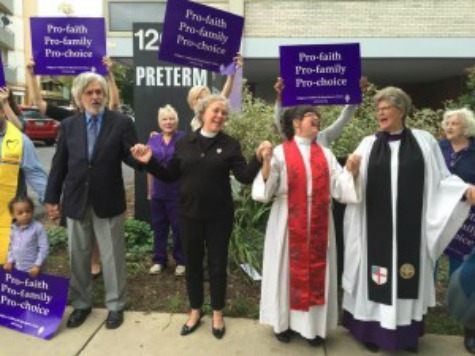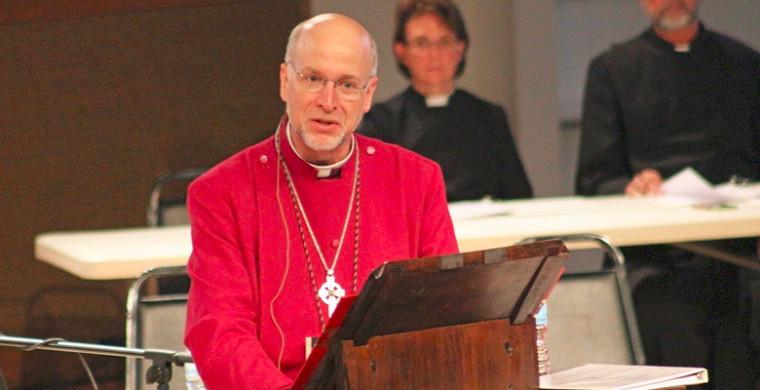Albany Episcopal Bishop at Odds with National Church over Abortion
Bishop Love blasts NY State's "Reproductive Health Act" legislation, calling it legalized killing of innocent human lives.
By David W. Virtue, DD
www.virtueonline.org
March 26, 2019
The Bishop of Albany, the Rt. Rev William Love has written a blistering attack on the state of New York's recent passage of the reproductive health act legalizing late term abortions, calling it "the legalized killing of innocent human lives."
The evangelical catholic bishop excoriated the language being used to describe abortion as positive acts of justice, promoting women's rights and showing compassion and mercy to the terminally ill. Unfortunately, the names given to these acts of legislation -- "Reproductive Health Act" and "Medical Aid in Dying Act" fail to accurately reflect the true nature of each bill -- the legalized killing of innocent human lives."
Bishop Love said the 'sanctity of human life' means that all human life is sacred because all people (Christians and non-Christians alike) are created by God in the "image and likeness of God." The bishop cited Genesis 1:26-28, the Book of Acts (Act 17: 24, 25, 28) and Psalm 127:3.
Regardless of how "positively" they may be presented -- abortion and assisted suicide are a direct attack on life itself, failing to recognize and uphold the sanctity of life, the bishop wrote in a letter to his diocese published in The Albany Episcopalian.
"As Christians, we perhaps more than anyone else, should know the importance of the sanctity of human life and to do all within our power to respect and protect the life of those around us, especially the most vulnerable amongst us -- the children (born and unborn), the sick and elderly."
Life, said the bishop, is a gift from God. It is His to give and His to take. It is our responsibility as the recipients of that gift, to try to live our lives as best we can by the grace of God for the time we are given in this world, regardless of what life might throw at us.
Love tore into the medical fraternity saying, "when doctors or others, actively take the life of an unborn child by abortion, or administer lethal medication to a terminally ill person (even if intended as an act of compassion and mercy to end a person's suffering), or an individual takes action to end his or her own life, they have put themselves in the place of God, not only taking responsibility which they have no right to, but may well be interfering in that which God is doing."
"The Lord does not waste anything. He may very well use an unplanned pregnancy, or a life-threatening illness to accomplish His purposes or bless a person or their loved ones in ways that they were initially blinded to as a result of their current circumstances, fear, sorrow, physical, or emotional pain an suffering. Jesus never promised that our life would be easy or free of pain, or sorrow, or suffering, or loss. But He did promise that He would be with us always, even to the end of the age."
Love said he shuddered to think of all the plans God had for the approximate 55 million babies that have been aborted in the U.S. following the Supreme Court's decision in Roe v. Wade to legalize abortion in 1973, or all the good that might have been accomplished had individuals suffering from terminal illnesses or severe depression not taken their life prematurely, or asked someone else to help them do so.
Love took aim at Bill No. A02694 pending legislation on "The Medical Aid in Dying Act," and said, "Like abortion, assisted suicide is a very controversial and hotly debated issue." When confronted with the possibility of a slow, painful, agonizing death for oneself or a loved one, assisted-suicide might very well seem like a more humane and merciful way to die. Unfortunately, what may seem like the more merciful thing to do from our standpoint, to take a person's life prematurely, either our own or a loved one, may very well interfere with that which God is trying to accomplish in the life of the person dying or their loved ones.
The bishop's stance stands in bold contrast and contradiction to the official position of the Episcopal Church on abortion.
 The Episcopal Church was historically anti-abortion. However, in 1994, the Church resolved fully to support legal, expressing its "unequivocal opposition to any... action... that [would] abridge the right of a woman to reach an informed decision about the termination of her pregnancy, or that would limit the access of a woman to a safe means of acting upon her decision."
The Episcopal Church was historically anti-abortion. However, in 1994, the Church resolved fully to support legal, expressing its "unequivocal opposition to any... action... that [would] abridge the right of a woman to reach an informed decision about the termination of her pregnancy, or that would limit the access of a woman to a safe means of acting upon her decision."
Over time, a succession of General Conventions passed 16 abortion-related resolutions, with the Church recognizing a woman's right to terminate her pregnancy, condoning abortion only in cases of rape or incest, cases in which a mother's physical or mental health is at risk, or cases involving fetal abnormalities. The church forbids "abortion as a means of birth control, family planning, sex selection or any reason of mere convenience."
In April 2004, a headline in the Episcopal News Service screamed: "Episcopalians show support for reproductive freedom at march."
 Georgette Forney, President of Anglicans for Life, said the irony of TEC's position concerning abortion based on the Resolution A054 from the 1994 Convention is that it states that all human life is sacred from its inception until death, and further quotes from the BCP (p.440) that the birth of a child is a joyous and solemn occasion, while ending with "Resolved, That this 71st General Convention of the Episcopal Church express its unequivocal opposition to any legislative, executive or judicial action of the part of local, state or national governments that abridges the right of a woman to reach an informed decision about the termination of pregnancy or that would limit the access of a women to safe means of acting on her decision."
Georgette Forney, President of Anglicans for Life, said the irony of TEC's position concerning abortion based on the Resolution A054 from the 1994 Convention is that it states that all human life is sacred from its inception until death, and further quotes from the BCP (p.440) that the birth of a child is a joyous and solemn occasion, while ending with "Resolved, That this 71st General Convention of the Episcopal Church express its unequivocal opposition to any legislative, executive or judicial action of the part of local, state or national governments that abridges the right of a woman to reach an informed decision about the termination of pregnancy or that would limit the access of a women to safe means of acting on her decision."
"In other words, TEC and its resolution acknowledge it is a human life -- a child in the womb but that the right to abortion trumps the rights of the baby to life. TEC puts the woman in the role of a god who decides who dies, while saying yeah God for creating the life -- she still has final say in the matter not You!!!"
That's an expected response from someone seeking to protect abortion, but the Church should be about the business of upholding Scripture's teaching, not affirming man's opinion, she said.
Holding views that oppose each other does not put TEC in the position of having any moral authority. But then, it could be argued, the Episcopal Church long ago abrogated its moral authority, repeatedly doing its best to affirm the zeitgeist on most moral issues, including sodomy and homosexual marriage, refusing to be a counter culture voice where Scripture is absolutely clear.
This is not the first time Bishop Love has come up against the powers that be. Recently he opposed the passage of Resolution B012 which mandated homosexual marriage in every diocese. For his "sin" he was partially inhibited by Presiding Bishop Michael Curry. Bishop Love is appealing that decision.
END














